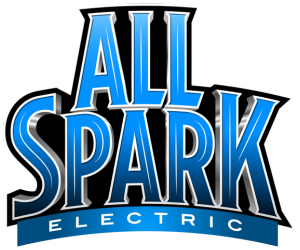If you’re planning to install a new appliance, subpanel, or EV charger, one of the most important questions to answer is: what wire size is right for a 50 amp circuit? Choosing the correct wire size for 50 amp applications ensures your system runs safely, efficiently, and in compliance with both local and national codes.
At All Spark Electric in Fort Worth, TX, we regularly help homeowners and businesses install 50 amp circuits for everything from electric stoves to backyard spas. In this blog, we’ll break down the basics of wire sizing, when it matters most, and why professional installation is the safest choice.
What Is the Standard Wire Size for 50 Amp Circuits?
For most residential installations, the standard wire size for 50 amp circuits is:
-
6 AWG copper wire, or
-
4 AWG aluminum wire
These wire sizes are based on the National Electrical Code (NEC) and assume a wire insulation rating of 75°C (167°F). They are suitable for typical 50 amp loads under normal conditions. However, there are several factors that can affect the final wire size recommendation for your specific project.
Factors That Affect Wire Size for 50 Amp Circuits
While 6 AWG copper is the most commonly recommended option, it’s not always the best or safest choice for every situation. Here are several important variables that affect wire size for 50 amp circuits:
1. Length of the Wire Run
If the wire has to travel a long distance from the breaker panel to the appliance or outlet, you’ll need to account for voltage drop. This drop in voltage is caused by resistance in the wire, and it becomes more pronounced the longer the wire is.
If your run exceeds 100 feet, consider upgrading to:
-
4 AWG copper, or
-
2 AWG aluminum
This helps ensure the appliance receives enough voltage and reduces the risk of overheating or poor performance.
2. Wire Material: Copper vs. Aluminum
Both copper and aluminum conduct electricity, but copper is more conductive and heat-resistant. That means it can safely carry more current through a smaller diameter wire.
Aluminum wire is typically less expensive and lighter, but it also requires special connectors and anti-oxidizing paste to reduce the risk of corrosion and thermal expansion. If aluminum is used, code requires upsizing the wire gauge to maintain the same current-carrying capacity.
For most residential 50 amp circuits, copper is the safer, more efficient choice, especially for indoor installations.
3. Wire Insulation Rating
Wires are rated for different temperature thresholds depending on the type of insulation used. A higher insulation rating means the wire can carry more current without overheating.
For example:
-
THHN or THWN-2 wire is typically rated for 90°C, which can allow for more ampacity if conditions permit.
-
NM-B (non-metallic sheathed wire) is typically rated for 60°C or 75°C, and its ampacity must be calculated accordingly.
However, keep in mind that the weakest link determines the maximum rating. If any device on the circuit—like a breaker or terminal—is only rated for 75°C, the entire circuit must be sized based on that.
Common Uses That Require a 50 Amp Wire Size
Homeowners and contractors often require a 50 amp circuit when powering large or high-demand electrical equipment. These include:
-
Electric ranges and wall ovens
-
Central air conditioners
-
Tankless water heaters
-
Hot tubs and spas
-
EV chargers and Level 2 charging stations
-
Detached buildings or garages
-
RV outlets for mobile vehicles or trailers
-
Subpanels for expanded service
Each of these applications draws a significant electrical load. Using the correct wire size for 50 amp circuits helps prevent electrical failure and extends the life of your equipment.
Fort Worth Code Requirements for 50 Amp Circuits
In Fort Worth, TX, all electrical work must follow the latest version of the National Electrical Code (NEC), as adopted by the city. Permits are typically required for new circuit installations, especially for high-load circuits like 50 amps.
The City of Fort Worth Planning & Development Department handles inspections and permitting. Any work must meet code requirements for wire gauge, circuit protection (breaker sizing), grounding, conduit, and insulation type.
At All Spark Electric, we handle this process from start to finish—ensuring your installation is code-compliant and safe for long-term use.
Risks of Using the Wrong Wire Size
Using the wrong wire size—whether it’s too small or improperly rated—can lead to serious and costly issues, including:
-
Overheating of wires, which increases fire risk
-
Breaker trips or nuisance shutdowns due to overload
-
Voltage drop, which can cause equipment to underperform or fail prematurely
-
Code violations, which may result in failed inspections or costly corrections during resale
These risks aren’t worth the savings of DIY or guesswork. A correctly installed circuit protects your investment and your home.
Can You Install a 50 Amp Circuit Yourself?
Technically, homeowners can install circuits in some areas if they pull a permit and schedule inspections—but working with a 50 amp circuit is not a beginner-level project. It involves:
-
Working inside your electrical panel
-
Selecting and installing the right wire and conduit
-
Choosing the correct breaker
-
Ensuring safe terminations and grounding
-
Meeting all code requirements
A small mistake—like using the wrong breaker or an undersized wire—can cause long-term damage or even start a fire. If you’re unsure, it’s best to hire a licensed electrician.
Why Choose All Spark Electric in Fort Worth?
At All Spark Electric, we have years of experience designing and installing circuits that meet the highest standards of safety and performance. Whether you’re upgrading your kitchen appliances, installing a new EV charger, or expanding your electrical service to a garage, our team ensures that your 50 amp wiring is done right.
We’ll evaluate your panel, determine the appropriate wire size for 50 amp loads, and provide a complete installation with permits and inspections included. You’ll get professional results that protect your home, equipment, and peace of mind. Contact us today to schedule your installation and get the job done safely and up to code.


